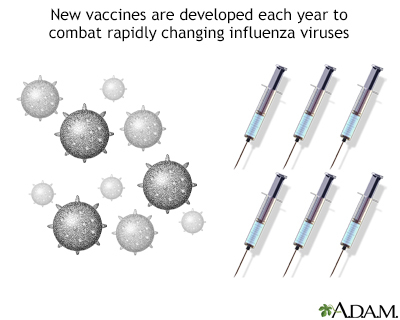Influenza (Flu) Vaccine (Inactivated or Recombinant): What You Need to Know
Definition
All content below is taken in its entirety from the CDC Inactivated Influenza Vaccine Information Statement (VIS) www.cdc.gov/vaccines/hcp/vis/vis-statements/flu.html
CDC review information for Inactivated Influenza VIS:
Page last updated: August 6, 2021
Information
Why get vaccinated?
Influenza vaccine can prevent influenza (flu).
Flu is a contagious disease that spreads around the United States every year, usually between October and May. Anyone can get the flu, but it is more dangerous for some people. Infants and young children, people 65 years and older, pregnant people, and people with certain health conditions or a weakened immune system are at greatest risk of flu complications.
Patient Education Video: Flu
Pneumonia, bronchitis, sinus infections, and ear infections are examples of flu-related complications. If you have a medical condition, such as heart disease, cancer, or diabetes, flu can make it worse.
Flu can cause fever and chills, sore throat, muscle aches, fatigue, cough, headache, and runny or stuffy nose. Some people may have vomiting and diarrhea, though this is more common in children than adults.
In an average year, thousands of people in the United States die from flu, and many more are hospitalized. Flu vaccine prevents millions of illnesses and flu-related visits to the doctor each year.
2. Influenza vaccines
CDC recommends everyone 6 months and older get vaccinated every flu season. Children 6 months through 8 years of age may need 2 doses during a single flu season. Everyone else needs only 1 dose each flu season.
It takes about 2 weeks for protection to develop after vaccination.
There are many flu viruses, and they are always changing. Each year a new flu vaccine is made to protect against the influenza viruses believed to be likely to cause disease in the upcoming flu season. Even when the vaccine doesn't exactly match these viruses, it may still provide some protection.
Influenza vaccine does not cause flu.
Influenza vaccine may be given at the same time as other vaccines.
3. Talk with your health care provider
Tell your vaccination provider if the person getting the vaccine:
- Has had an allergic reaction after a previous dose of influenza vaccine, or has any severe, life-threatening allergies.
- Has ever had Guillain-Barré Syndrome (also called "GBS").
In some cases, your health care provider may decide to postpone influenza vaccination until a future visit.
Influenza vaccine can be administered at any time during pregnancy. People who are or will be pregnant during influenza season should receive inactivated influenza vaccine.
People with minor illnesses, such as a cold, may be vaccinated. People who are moderately or severely ill should usually wait until they recover before getting influenza vaccine.
Your health care provider can give you more information.
4. Risks of a vaccine reaction.
- Soreness, redness, and swelling where the shot is given, fever, muscle aches, and headache can happen after influenza vaccination.
- There may be a very small increased risk of Guillain-Barré Syndrome (GBS) after inactivated influenza vaccine (the flu shot).
Young children who get the flu shot along with pneumococcal vaccine (PCV13) and/or DTaP vaccine at the same time might be slightly more likely to have a seizure caused by fever. Tell your health care provider if a child who is getting flu vaccine has ever had a seizure.
People sometimes faint after medical procedures, including vaccination. Tell your provider if you feel dizzy or have vision changes or ringing in the ears.
As with any medicine, there is a very remote chance of a vaccine causing a severe allergic reaction, other serious injury, or death.
5. What if there is a serious problem?
An allergic reaction could occur after the vaccinated person leaves the clinic. If you see signs of a severe allergic reaction (hives, swelling of the face and throat, difficulty breathing, a fast heartbeat, dizziness, or weakness), call 9-1-1 and get the person to the nearest hospital.
For other signs that concern you, call your health care provider.
Adverse reactions should be reported to the Vaccine Adverse Event Reporting System (VAERS). Your health care provider will usually file this report, or you can do it yourself. Visit the VAERS website at www.vaers.hhs.gov or call 1-800-822-7967. VAERS is only for reporting reactions, and VAERS staff members do not give medical advice.
6. The National Vaccine Injury Compensation Program.
The National Vaccine Injury Compensation Program (VICP) is a federal program that was created to compensate people who may have been injured by certain vaccines. Claims regarding alleged injury or death due to vaccination have a time limit for filing, which may be as short as two years. Visit the VICP website at www.hrsa.gov/vaccine-compensation/index.html or call 1-800-338-2382 to learn about the program and about filing a claim.
7. How can I learn more?
- Ask your health care provider.
- Call your local or state health department.
- Visit the website of the Food and Drug Administration (FDA) for vaccine package inserts and additional information at www.fda.gov/vaccines-blood-biologics/vaccines.
Contact the Centers for Disease Control and Prevention (CDC):
- Call 1-800-232-4636 (1-800-CDC-INFO) or
- Visit CDC's influenza website at www.cdc.gov/flu
Gallery


References
Centers for Disease Control and Prevention website. Vaccine Information Statement. Influenza (Flu) Vaccine (Inactivated or Recombinant): What you need to know. www.cdc.gov/vaccines/hcp/vis/vis-statements/flu.html. Updated August 6, 2021. Accessed August 12, 2021.